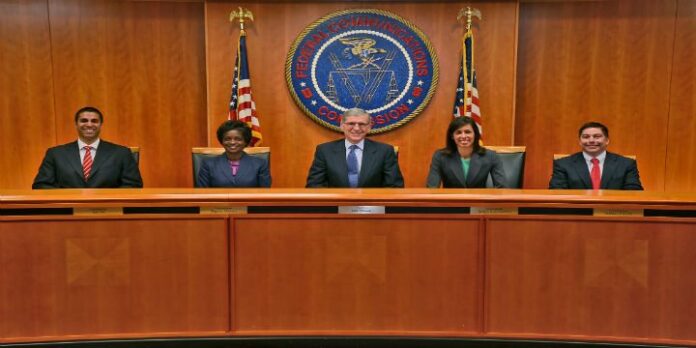FCC vote puts pressure on Dish to come up with funds or find alternatives
The Federal Communications Commission voted in favor of denying Dish Network $3 billion in bidding credits it garnered during a recent spectrum auction.
The FCC voted this week to reverse bidding credits originally granted to a pair of designated entities tied to financial backing from Dish Network. The credits were awarded to SNR Wireless and Northstar Wireless, which during the recent AWS-3 spectrum auction ended up with total auction bids of more than $13 billion. However, since the licenses were won by the previously approved DEs, a 25% bidding credit knocked down the total amount due to just $10 billion.
Following close of the record-setting auction, The Wall Street Journal put together a graphic highlighting Dish Network’s relationship to Northstar, showing its tangential controlling stake behind the scenes.
The FCC’s DE program allows for a 15% credit for small businesses, which are those with annual gross revenue of less than $40 million for the preceding three years, and 25% for “very small business,” or those with less than $15 million in annual gross revenue. Dish Network has annual revenue of nearly $14 billion.
“Small businesses require an on-ramp into the mobile marketplace to provide more choices for consumers,” explained FCC Chairman Tom Wheeler in a statement tied to the bidding credit revocation. “Our competitive bidding rules were designed to do just that – give bona fide small businesses an opportunity to acquire valuable spectrum. … Our review of two winning bidders in the recent AWS-3 auction has concluded that they in fact are not eligible for bidding credits. I’m proud that our thorough, fact-based analysis ensures that bidding credits only go to the small businesses our rules aim to serve.”
Speaking to investors and the media following the release of its second-quarter financial results, Dish Network’s management said the company is looking at various possibilities in terms of its spectrum holdings, including the possible sale or leasing of some of those assets.
Dish CEO Charlie Ergen said company options include not paying the FCC, which would incur a 15% penalty on top of potentially other charges; paying the full amount on the licenses excluding the DE discount; or filing a lawsuit against the FCC. Ergen’s further explanation seemed to indicate the company was leaning toward the second option, noting that such a move would then free up Dish and its DE partners to sell or lease that spectrum to other parties.
That move could also see Dish Network separate its business into satellite operations and spectrum holdings. Dish owns a fairly substantial swath of spectrum ranging from the 700 MHz band up to the lower 2 GHz band, with some of those holdings downlink-only channels that are seen as particularly valuable for streaming video content. AT&T recently noted that Dish Network is sitting on an average of 81 megahertz of spectrum across the nation’s top 100 markets, with most of that in so-called midband locations.
Dish also noted that uncertainty over the $3 billion DE discount has prevented the company from making further progress on potential partnerships or acquisitions in the mobile space. Ergen was specifically asked about a deal with T-Mobile US, which he said had been complicated by the current discount issue.
Dish Network’s stock tumbled late last month following reports it had fallen short on terms being put forth by T-Mobile US parent company Deutsche Telekom. Dish has for years been linked to a potential bid for T-Mobile US after falling short in a previous attempt to acquire Sprint.
The financial uncertainty is also damping Dish Network’s enthusiasm toward the FCC’s planned 600 MHz incentive auction process, currently scheduled for early next year.
“Obviously, to the extent that the FCC requires us to pay the discount in the last auction, then it would be a complicating factor for us in that auction,” Ergen explained.
DE flashpoint
In looking to stymie such issues moving forward, the FCC formally adopted a Report and Order updating bidding rules for future auctions, including adjustments to the DE process. The rulemaking includes the establishment of a cap on the total amount of bidding credits a small business or rural service provider can receive, which will vary on a “service-by-service and auction-by-auction” basis. For the upcoming 600 MHz incentive auction, the Report and Order looks to adopt a cap of $150 million for small businesses and a $10 million ceiling on the overall amount any single entity can receive in smaller markets.
Other provisions of the Report and Order include the elimination of rules that previously limited the amount of spectrum a small business can lease. The FCC noted this change would provide more flexibility for small businesses to leverage leasing and spectrum use agreements to “gain access to capital and operational experience.” The FCC also amended competitive bidding rules to eliminate joint bidding and multiple applications by a single party and parties with common controlling interests except in the case of “limited circumstances.”
The FCC’s DE program has been a flashpoint since its inception ahead of the PCS auctions in the mid-90s. The move was initially an attempt by the FCC to inject more competition into the mobile telecom space, with a focus on minority- or woman-owned small businesses. However, established operators have used the rules to partner with entities granted DE status to get their hands on licenses for a discount, a move that had been expected since the beginning.
The FCC has attempted to curtail abuse of the DE program by setting up build-out requirements for licenses that would force operators to put spectrum to work and keep out those that may look to sit on licenses before flipping them to larger operators. Those requirements have met with limited success as license holders have found ways to meet the rules, while in actuality not offering a commercial wireless service.
Bored? Why not follow me on Twitter

